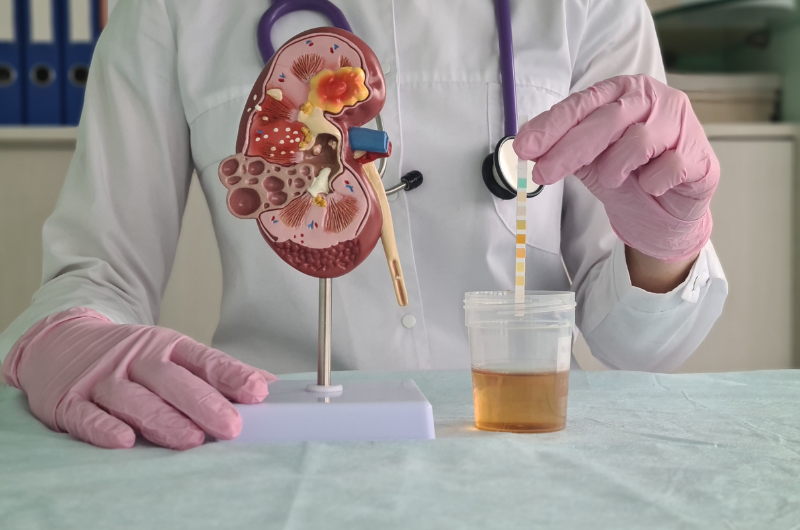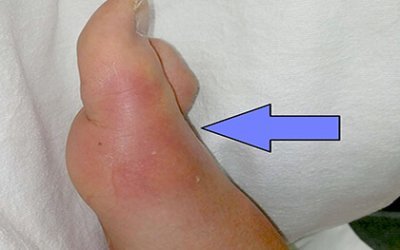Blood in Urine (Hematuria): How to Treat Naturally?

Understanding Blood in Urine (Hematuria) And Its Significance
Blood in the urine, or hematuria, can be alarming and is a symptom that should never be ignored. This article explores the potential causes, diagnostic methods, and natural treatment options for hematuria, emphasizing holistic and herbal remedies. Understanding the underlying reasons for hematuria is crucial for effective management and overall health.
1. Causes of Blood in Urine (Hematuria)
1.1. Common Causes
Urinary Tract Infections (UTIs): UTIs are a frequent cause of hematuria, especially in women. Bacteria enter the urinary tract, leading to infection and inflammation, which can cause blood to appear in the urine.
Kidney Stones: Small, hard mineral deposits that form in the kidneys can cause severe pain and bleeding when they move through the urinary tract.
Bladder or Kidney Infections: Infections in the bladder (cystitis) or kidneys (pyelonephritis) can cause hematuria due to the inflammation and irritation of these organs.
Prostate Issues in Men: Enlarged prostate or prostatitis can cause blood in the urine, particularly in older men.
1.2. Less Common Causes
Intense Exercise: Hematuria can occur after strenuous exercise, known as “exercise-induced hematuria.” It is usually temporary and resolves with rest.
Trauma to the Urinary Tract: Injuries to the kidneys, bladder, or other parts of the urinary system can result in bleeding.
Certain Foods: Foods like beets, berries, and rhubarb can cause urine to appear red or pink, mimicking the appearance of blood.
Herbal and Dietary Supplements: Some supplements may affect urine color and should be evaluated as potential causes of hematuria.
1.3. Underlying Health Conditions
Kidney Disease: Chronic kidney diseases can cause persistent hematuria and require medical attention for proper management.
Cancer: Bladder, kidney, or prostate cancer can present with hematuria. Early detection through proper diagnosis is essential for treatment.
2. Diagnosing Hematuria
2.1. Initial Assessment
When hematuria is noticed, a medical evaluation is necessary to determine the cause. Common diagnostic tests include:
Urinalysis: A urinalysis can detect blood, bacteria, and other substances in the urine.
Imaging Tests: Ultrasounds, CT scans, or MRIs can help visualize the urinary tract to identify stones, tumors, or other abnormalities.
Cystoscopy: This procedure involves using a camera to examine the bladder and urethra directly.
2.2. Monitoring Symptoms
Symptom Diary: Keeping a diary to track the occurrence of hematuria and any related symptoms can help healthcare providers diagnose the cause more accurately.
Follow-Up Tests: Regular follow-up tests may be necessary to monitor the condition and ensure it is resolving or responding to treatment.
3. Natural Treatment Options for Hematuria
3.1. Dietary Adjustments
Increase Fluid Intake: Drinking plenty of water helps flush out the urinary system, reducing the risk of infections and kidney stones.
Foods to Avoid: Reduce intake of oxalate-rich foods (like spinach and nuts) if prone to kidney stones. Avoid foods that may artificially color the urine.
Foods to Include: Include hydrating and anti-inflammatory foods such as cucumbers, watermelon, and celery in your diet.
3.2. Herbal Remedies
Aloe vera: Swallow 1/10 tsp of aloe vera pulp every morning for a week.
Drumstick plant: Grind together a handful of roots, bark, and 1 tsp black peppercorns into a very fine paste and apply on the lower abdomen. (note: external application only).
Durva grass (cynodon dactylon): Grind 2 tbsp cleaned grass along with 1 tbsp keezhanelli into a fine paste. Add 1 cup diluted buttermilk. drink every morning.
Cranberry Juice: Cranberry juice is known to prevent UTIs and support bladder health.
Dandelion Root Tea: Acts as a diuretic and helps detoxify the kidneys. A study supports its use for improving urinary health.
Nettle Leaf Tea: Reduces inflammation and supports overall urinary health. Research shows its benefits in treating benign prostatic hyperplasia, which can cause hematuria in men .
Marshmallow Root: Soothes the urinary tract lining and reduces irritation, promoting healing and comfort.
Uva Ursi: Known for its antimicrobial properties, uva ursi helps fight infections in the urinary tract.
3.3. Lifestyle Modifications
Regular Exercise: Gentle exercises can improve overall health without straining the urinary tract.
Avoiding Smoking and Excessive Alcohol: Both can irritate the bladder and kidneys, exacerbating hematuria.
Stress Management Techniques: Practices like yoga and meditation reduce stress, which can impact urinary health.
3.4. Home Remedies
Hydration: Drink plenty of water daily to keep the urinary system flushed and functioning properly.
Warm Compress: Applying a warm compress to the lower abdomen can alleviate pain and discomfort associated with hematuria.
4. Preventive Measures to Avoid Hematuria
4.1. Regular Check-Ups
Routine Health Check-Ups: Regular medical check-ups and urine tests can help detect and prevent urinary issues early.
4.2. Healthy Diet
Balanced Diet: Maintain a diet rich in fruits, vegetables, and whole grains. Reduce salt and processed foods to support kidney and bladder health.
4.3. Safe Exercise Practices
Exercise Guidelines Engage in safe exercise practices to prevent trauma to the urinary tract. Avoid overexertion.
5. When to Seek Medical Attention
Persistent or Severe Symptoms: Seek immediate medical evaluation if hematuria is accompanied by severe pain, frequent urination, fever, or any other concerning symptoms.
6. Conclusion: Embracing Natural Health Practices
Understanding the causes and natural treatment options for hematuria can empower you to manage this condition effectively. By adopting a holistic approach that includes proper hydration, a balanced diet, and the use of beneficial herbs, you can maintain a healthy urinary system naturally. Always consult with healthcare professionals for persistent or severe symptoms to ensure proper diagnosis and treatment.
References
- National Center for Biotechnology Information. (n.d.). Dandelion Root: Traditional Medicine and Benefits. Retrieved from NCBI
- National Institutes of Health. (n.d.). Nettle Leaf: Clinical Studies and Benefits. Retrieved from NIH
- National Library of Medicine. (n.d.). Uva Ursi: Antimicrobial Properties and Uses. Retrieved from NLM
Dos
Stay Hydrated:
- Drink at least 8 glasses of water a day to help flush out the urinary system.
Eat Hydrating Foods:
- Include fruits and vegetables like cucumbers, watermelon, oranges, and celery in your diet.
Use Herbal Teas:
- Drink cranberry juice, dandelion root tea, nettle leaf tea, and marshmallow root tea to support urinary health.
Monitor Symptoms:
- Keep a diary to track the occurrence of hematuria and any related symptoms for better diagnosis.
Maintain a Balanced Diet:
- Consume a diet rich in fruits, vegetables, and whole grains, and reduce salt and processed foods.
Exercise Regularly:
- Engage in gentle exercises to improve overall health without straining the urinary tract.
Practice Stress Management:
- Use stress-reducing techniques such as yoga and meditation to promote overall well-being.
Use Warm Compresses:
- Apply a warm compress to the lower abdomen to alleviate pain and discomfort associated with hematuria.
Seek Regular Medical Check-Ups:
- Regular health check-ups and urine tests can help detect and prevent urinary issues early.
Don’ts
Don’t Ignore Persistent Changes:
- Do not ignore persistent hematuria, especially if accompanied by other symptoms like pain or fever.
Avoid Dehydration:
- Do not neglect your fluid intake, as dehydration can exacerbate hematuria.
Limit Processed Foods:
- Avoid processed foods and those high in artificial dyes which can alter urine color.
Avoid Excessive Protein Intake:
- Do not consume excessive amounts of protein, which can lead to kidney strain and cloudy or foamy urine.
Limit Sugary and Caffeinated Beverages:
- Reduce intake of sugary drinks and caffeine, which can dehydrate the body.
Don’t Rely Solely on Synthetic Supplements:
- Avoid over-reliance on synthetic supplements that might alter urine color; prefer natural sources.
Avoid Smoking and Excessive Alcohol:
- Both can irritate the bladder and kidneys, potentially worsening hematuria.
Don’t Ignore Symptoms of Infection:
- Do not ignore symptoms of urinary tract infections like a burning sensation or frequent urge to urinate. Seek natural remedies or medical advice.
Avoid Holding Urine:
- Do not hold urine for long periods, as this can increase the risk of urinary tract infections.
Send Us A Message
FAQs
- Not always. While hematuria can be a sign of serious conditions like kidney disease or cancer, it can also be caused by less severe issues such as a UTI or vigorous exercise. It's important to consult a healthcare provider to determine the cause.
- Common causes include urinary tract infections (UTIs), kidney stones, bladder or kidney infections, and prostate issues in men. Intense exercise and certain foods can also cause hematuria.
- Diagnosis typically involves a urinalysis to detect blood and other substances, imaging tests (ultrasound, CT scan, MRI), and sometimes a cystoscopy to examine the bladder and urethra directly.
- Dehydration itself does not cause blood in the urine, but it can exacerbate underlying conditions that might lead to hematuria, such as kidney stones or UTIs.














